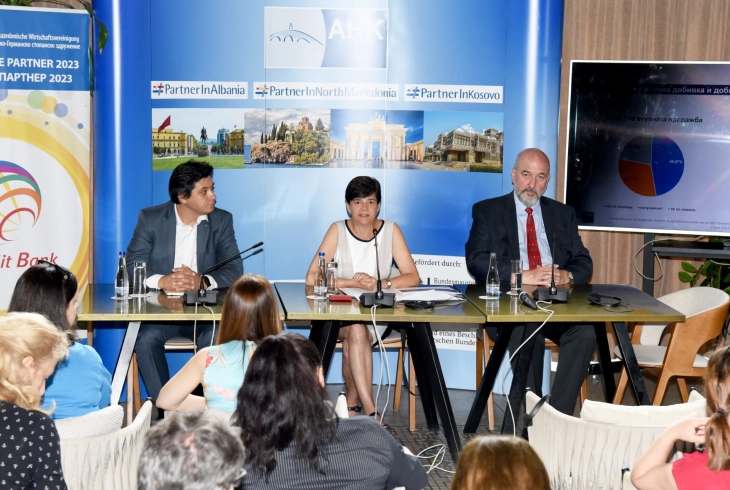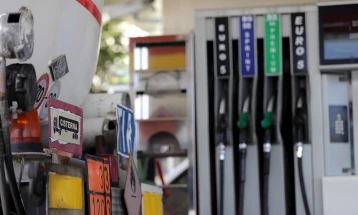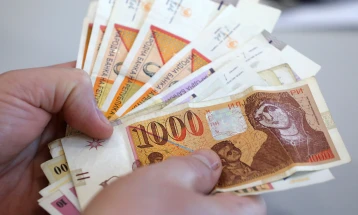Survey: 80 percent of German companies would invest in North Macedonia again
- Eighty percent of German companies would invest in North Macedonia again, and for 71 percent the increase in energy crisis is one of the biggest risks for their development, according to a survey on the business climate presented on Wednesday by the Delegation of German Industry and Commerce in North Macedonia (AHK) and the Macedonian-German Economic Association.
- Post By Ivan Kolekevski
- 14:41, 7 June, 2023

Skopje, 7 June 2023 (MIA) - Eighty percent of German companies would invest in North Macedonia again, and for 71 percent the increase in energy crisis is one of the biggest risks for their development, according to a survey on the business climate presented on Wednesday by the Delegation of German Industry and Commerce in North Macedonia (AHK) and the Macedonian-German Economic Association.
The survey, conducted in period January-March, included 45 out of the total 150 members of the organization, with 80 percent of those surveyed saying that they wanted to expand investments and increase the number of job positions in North Macedonia. The surveyed companies said that they were satisfied with employees' qualifications and productivity, as well as the quality and availability of local suppliers, and expressed disappointment over the fight against corruption, legal security, and efficiency of public administration.
Antje Wandelt, head of AHK and head of the Management Board of the Macedonian-German Economic Association, emphasized the role Germany plays as an important trading partner, and one of the biggest investors in North Macedonia.
"The world economy, along with our two economies, are in a difficult position, but it is a fact that we have a positive trend in trade exchange, which last year amounted to EUR 4,8 billion," Wandelt noted.

According to survey results, 2023 compared to 2022 saw a 10 percent increase in the number of German companies wanting to expand investments in North Macedonia, and only 11 percent expect to reduce the number of job positions, while 30 percent want to increase it.
Deputy Ambassador of Germany, Otto Graf, said that despite the challenges in the economy, there are signs indicating that the already present investors are satisfied. This statement is supported by the fact that 80 percent of the surveyed companies would choose North Macedonia as a location for their investments again.
The survey results show that German investors are dissatisfied with the anti-corruption processes and procedures, public administration inefficiency, and legal safety skepticism, which complicates their long-term plans for activities.

The surveyed companies positively rated their own business situation, while the general economic situation was a little less positive. Thereby, 22 percent of companies rated their own business situation as good, 31 percent expect improvements in 2023, which is an 11 percent increase from 2022.
The percentage of those who expect improvements in the business results in their own companies for 2023 has increased. Almost half of the surveyed companies, or 47 percent, expect an increase in sales. There is a positive trend in the export sales, 39 percent of respondents expect an increase in exports, which is an increase from the 28 percent in 2022.
According to 22.3 percent, international supply chains will be normalized until the end of 2023, while 2.2 percent expect it to happen in two months, 44.44 percent said 'within the next year,' and 20 percent believe that there will be no extensive return to the original state.
German companies operating in North Macedonia employ more than 20,000 people, but the survey points to the lack of qualified workers. Wandelt reminded about the program for dual vocational education based on the German model done in cooperation with 15 partner companies and 7 vocational schools in Kavadarci, Veles, Prilep, Bitola, Ohrid, Tetovo, and Kumanovo. At the moment, 420 students are enrolled and taught according to such standards, and 135 students will be enrolled in 2023.
Out of the surveyed companies, 6 percent are based in the country, 33 percent in Germany, and 4.4 percent in Austria. The majority are small and medium-sized companies with less than 250 employees. ssh/ik/
Photo: AHK, MIA







